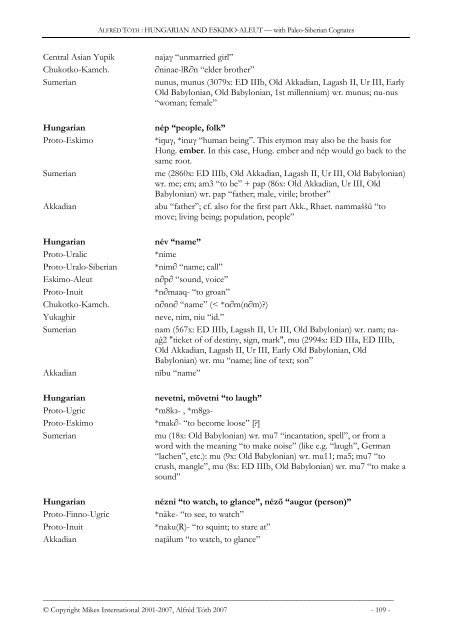Hungarian and Eskimo-Aleut
Hungarian and Eskimo-Aleut
Hungarian and Eskimo-Aleut
Create successful ePaper yourself
Turn your PDF publications into a flip-book with our unique Google optimized e-Paper software.
ALFRÉD TÓTH : HUNGARIAN AND ESKIMO-ALEUT — with Paleo-Siberian Cognates<br />
Central Asian Yupik najaγ “unmarried girl”<br />
Chukotko-Kamch. ∂ninae-lR∂n “elder brother”<br />
Sumerian nunus, munus (3079x: ED IIIb, Old Akkadian, Lagash II, Ur III, Early<br />
Old Babylonian, Old Babylonian, 1st millennium) wr. munus; nu-nus<br />
“woman; female”<br />
<strong>Hungarian</strong> nép “people, folk”<br />
Proto-<strong>Eskimo</strong> *iŋuγ, *inuγ “human being”. This etymon may also be the basis for<br />
Hung. ember. In this case, Hung. ember <strong>and</strong> nép would go back to the<br />
same root.<br />
Sumerian me (2860x: ED IIIb, Old Akkadian, Lagash II, Ur III, Old Babylonian)<br />
wr. me; em; am3 “to be” + pap (86x: Old Akkadian, Ur III, Old<br />
Babylonian) wr. pap “father; male, virile; brother”<br />
Akkadian abu “father”; cf. also for the first part Akk., Rhaet. nammaššū “to<br />
move; living being; population, people”<br />
<strong>Hungarian</strong> név “name”<br />
Proto-Uralic *nime<br />
Proto-Uralo-Siberian *nim∂ “name; call”<br />
<strong>Eskimo</strong>-<strong>Aleut</strong> n∂p∂ “sound, voice”<br />
Proto-Inuit *n∂maaq- “to groan”<br />
Chukotko-Kamch. n∂nn∂ “name” (< *n∂m(n∂m)?)<br />
Yukaghir neve, nim, niu “id.”<br />
Sumerian nam (567x: ED IIIb, Lagash II, Ur III, Old Babylonian) wr. nam; naaĝ2<br />
"ticket of of destiny, sign, mark", mu (2994x: ED IIIa, ED IIIb,<br />
Old Akkadian, Lagash II, Ur III, Early Old Babylonian, Old<br />
Babylonian) wr. mu “name; line of text; son”<br />
Akkadian nību “name”<br />
<strong>Hungarian</strong> nevetni, mövetni “to laugh”<br />
Proto-Ugric *m8kз- , *m8gз-<br />
Proto-<strong>Eskimo</strong> *mak∂- “to become loose” [?]<br />
Sumerian mu (18x: Old Babylonian) wr. mu7 “incantation, spell”, or from a<br />
word with the meaning “to make noise” (like e.g. “laugh”, German<br />
“lachen”, etc.): mu (9x: Old Babylonian) wr. mu11; ma5; mu7 “to<br />
crush, mangle”, mu (8x: ED IIIb, Old Babylonian) wr. mu7 “to make a<br />
sound”<br />
<strong>Hungarian</strong> nézni “to watch, to glance”, néző “augur (person)”<br />
Proto-Finno-Ugric *näke- “to see, to watch”<br />
Proto-Inuit *naku(R)- “to squint; to stare at”<br />
Akkadian natālum “to watch, to glance”<br />
___________________________________________________________________________________<br />
© Copyright Mikes International 2001-2007, Alfréd Tóth 2007 - 109 -

















